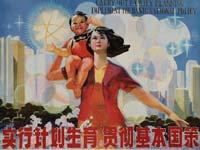Probe into Chinese baby adoptions

China is investigating reports that about 20 babies were seized under the country’s one-child-per-family policy and put up for international adoption.
Chinese media say family planning officials in Hunan province took the children from poor homes unable to pay fines for having more than one child.
The children were allegedly listed as orphans and adopted by foreigners for fees of about US$3,000 each. Xinhua news agency said some were now in North America , the Netherlands and Poland.
The reports first appeared in Caixin magazine and caused such outrage that the Hunan provincial government has launched a formal investigation.
The Caixin Magazine reported that at least 20 babies were forcefully taken away from families in Hunan province. Birth control officials sell the babies to welfare agencies. They’re then put up for adoption overseas.
Caixin says this has been happening for ten years. Officials reportedly receive 1000 Yuan — or 155 U.S. dollars — for each child they sell. Welfare agencies can then receive up to $3,000 for each adopted child.
In their move to reduce population growth, the Chinese regime allows most families to only have one child. The policy has long been criticized because family planning officials often abuse enforcement laws to make a profit.
One couple said their only child was taken away by mistake while they were working in another city. Migrant worker Yang Libing told Caixin he had since tracked down his daughter, now seven years old and living in the US.
Tens of thousands of Chinese children have been adopted by foreign couples since the one-child policy came into force in the 1980s.
The policy was aimed at curbing China’s surging population.
Latest census figures revealed last month showed China’s population grew to 1.34 billion people by 2010, with a sharp rise in those over 60.
The figures showed China’s population was growing more slowly than in the past.
Under the one-child policy, aimed at controlling China’s world-leading population of more than 1.3 billion, people who live in urban areas are generally allowed one child, while rural families can have two if the first is a girl.
This has put a premium on baby boys, while baby girls are often sold off, abandoned or put up for adoption.
In a report released in December, the Hong Kong-based Chinese Human Rights Defenders (CHRD) cited widespread abuse including forced abortions, sterilisations, insertions of intrauterine devices and coerced testing for pregnancy.
Both men and women found to have violated the policy have been beaten, detained, or fined. Others have lost their jobs, or been denied household registration permits for their children, CHRD alleged.
China is also battling a severe gender imbalance. A census recently completed in the country found 118.06 males were born in China to every 100 baby girls over the past 10 years.
Up to 80,000 Chinese children have reportedly been adopted by overseas families in recent decades, with most finding homes in North America.
In 2009 the Canadian government called on China to respond to claims that Chinese babies are being kidnapped from their parents and sold to orphanages so as to be adopted by Canadians and other Westerners.
The Canadian embassy in Beijing has reportedly requested that an investigation be conducted by the China Centre of Adoption Affairs (CCAA), the Chinese federal agency in charge of the country’s international adoption program, according to lifesite news.
This news follows an investigative report last month in the Los Angeles Times, which revealed horrific stories of babies being kidnapped from their parents by Chinese ‘family planning’ officials who later sold them through orphanages for a U.S. $3,000 adoption fee.
In 2007, the U.K’s Daily Mail and other media reported that approximately 70,000 babies in the country disappear every year, or 190 per day.
The Netherlands expressed concerns in 2008 to China about corruption in their adoption system, according to World Children, the largest adoption agency in Holland. Their questions were met, however, with threats of trade retaliation.









